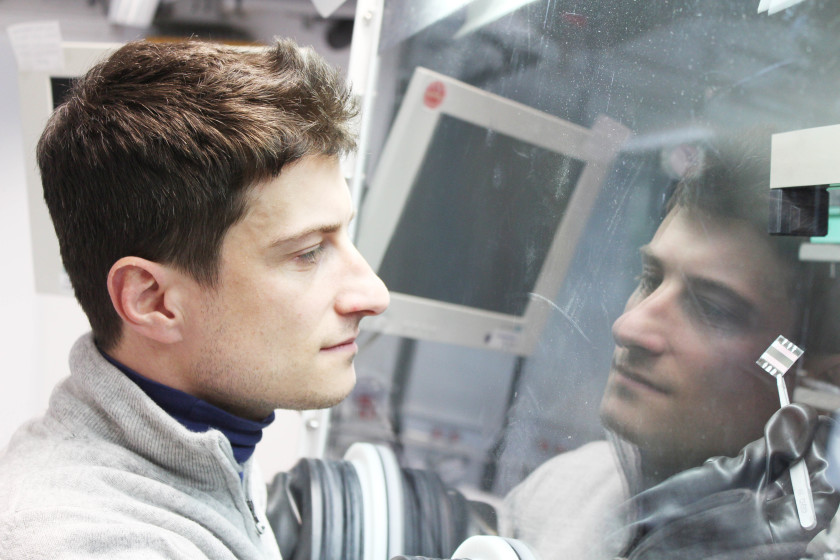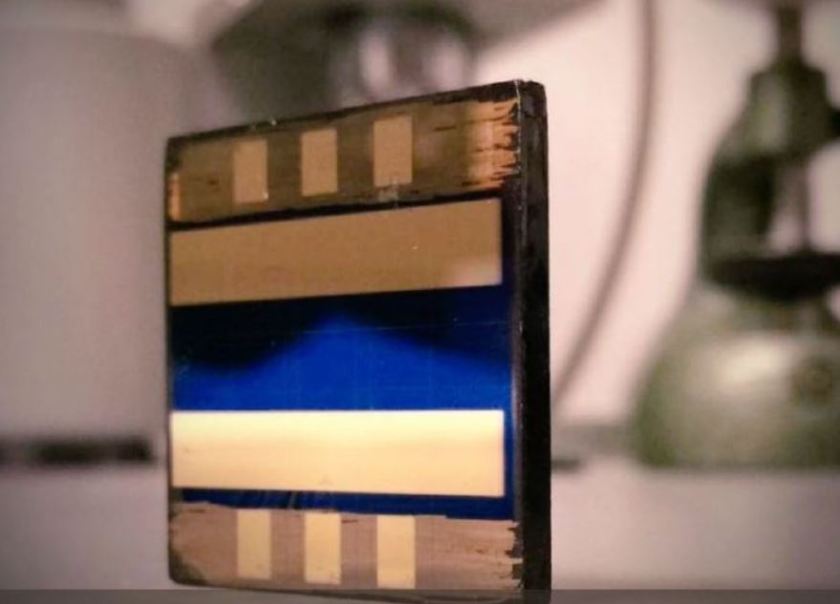ERC Starting Grant awarded to Antonio Abate

Antonio Abate is an internationally renowned perovskite researcher. © J. Böhm/HZB

Gold contacts are applied to the perovskite layer. © W. Zuo/HZB
HZB scientist Dr. Antonio Abate has been awarded an ERC Starting Grant for his research project on perovskite solar cells. The ERC Starting Grant supports outstanding researchers in an early phase of their scientific careers with up to 1.5 million euros over five years and is considered one of the most important European awards.
Abate heads a Helmholtz Young Investigator Group at the HZB on organometallic perovskite solar cells since 2017. He was a member of Prof. Henry Snaith’s team at the University of Oxford when they achieved a step increase to eleven per cent in the efficiency level. Since then, perovskite solar cells have achieved efficiencies of more than twenty per cent. No other material class has shown such a rapid increase in photovoltaic effiency so far.
Abate is investigating processes both within the layer and at its interfaces. He intends to use the ERC Starting Grant to develop perovskite layers in which the environmentally harmful lead atoms can be replaced by less problematic elements.
He prevailed in a rigorous application selection process. 3,170 applications for the Starting Grants were received from all over Europe, of which 403 were approved. This represents a selection rate of about 13 percent.
“Our sincerest congratulations to Antonio Abate for this great success! In recent years, we at HZB have significantly intensified our efforts in the field of perovskite research and established several groups, because good research also needs critical mass in order to achieve synergy effects”, says Prof. Bernd Rech, acting Scientific Director of the HZB.
arö
https://www.helmholtz-berlin.de/pubbin/news_seite?nid=14868;sprache=en
- Copy link
-
MXene for energy storage: More versatile than expected
MXene materials are promising candidates for a new energy storage technology. However, the processes by which the charge storage takes place were not yet fully understood. A team at HZB has examined, for the first time, individual MXene flakes to explore these processes in detail. Using the in situ Scanning transmission X-ray microscope 'MYSTIIC' at BESSY II, the scientists mapped the chemical states of Titanium atoms on the MXene flake surfaces. The results revealed two distinct redox reactions, depending on the electrolyte. This lays the groundwork for understanding charge transfer processes at the nanoscale and provides a basis for future research aimed at optimising pseudocapacitive energy storage devices.
-
Bernd Rech elected to the BR50 Board of Directors
The Scientific Director at Helmholt-Zentrum Berlin is the new face behind the "Natural Sciences" unit at Berlin Research 50 (BR50). Following the election in December 2025, the constituent meeting of the new BR50 Board of Directors took place on 22 January 2026.
Its members are Michael Hintermüller (Weierstrass Institute, WIAS), Noa K. Ha (German Centre for Integration and Migration Research, DeZIM), Volker Haucke (Leibniz Research Institute for Molecular Pharmacology, FMP), Uta Bielfeldt (German Rheumatism Research Centre Berlin, DRFZ) and Bernd Rech (HZB).
-
A record year for our living lab for building-integrated PV
In 2025, our solar facade in Berlin-Adlershof generated more electricity than in any of the previous four years of operation.
